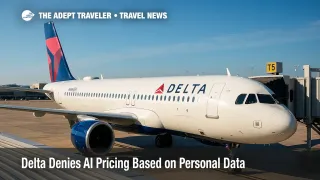Delta Denies AI Pricing Based on Personal Data

Delta Air Lines has moved to quell a week-long storm over the role of artificial intelligence in airfare setting. In a letter to three U.S. senators released August 1, the Atlanta-based carrier said "there is no fare product Delta has ever used, is testing, or plans to use that targets customers with individualized prices based on personal data." The statement follows bipartisan criticism that AI-driven "pain-point" pricing could squeeze travelers at a time of stubborn inflation. Delta insists its upcoming Fetcherr pilot will only accelerate existing demand forecasting, not peer into wallets.
Key Points
- Why it matters: Lawmakers worry AI could let airlines charge each traveler the most they are willing to pay.
- Travel impact: Delta says ticket prices will still rise or fall for everyone together, based on route demand.
- What's next: Senators want proof; Delta must file a fuller explanation of its Fetcherr rollout within 30 days.
- Pilot covers 20 percent of domestic network by late 2025.
- Rival carriers face renewed scrutiny of their own dynamic-pricing systems.
Snapshot
Delta's reassurance lands after Democratic senators Ruben Gallego, Mark Warner, and Richard Blumenthal warned that AI may "exploit personal pain points." The lawmakers cited remarks by Delta President Glen Hauenstein, who last year praised AI tools that learn "what people are willing to pay." Facing mounting headlines and social-media outrage, Delta now says its analysts-not algorithms-remain in charge of fares. The Fetcherr engine will crunch historic bookings, fuel prices, and competitive data but will never ingest a traveler's loyalty history, search behavior, or demographic profile. Delta also pledged to submit any future AI upgrade to an internal ethics board.
Background
Airlines have long practiced dynamic pricing, tweaking fares dozens of times a day. What changed is the marketing hype around "generative" AI. Delta began testing Fetcherr in 2023 on less than three percent of flights, touting double-digit revenue gains. In July 2025, Bloomberg reported plans to scale the system to one-fifth of the U.S. network, sparking fears of micro-targeted gouging. The controversy echoes a 2024 Senate hearing on "junk fees," where carriers were grilled over seat-selection charges and premium-phone-line upsells. Earlier, our own coverage showed American Airlines distancing itself from AI fare engines. American Airlines Rejects AI Fare Pricing Amid Delta Push.
Latest Developments
Lawmakers seek guardrails on dynamic fares
The senators have asked Delta to detail how Fetcherr filters out personal identifiers and whether outside auditors have vetted the code. They are also drafting a bill that would bar any company from "using personal data to set or influence price or wages." Consumer groups want DOT to require public disclosure whenever AI helps decide a fare. A Reuters report says Delta's letter stresses that pricing still responds to "market dynamics and vigorous competition," not individual profiles, and that the system cannot even see passenger names. Delta's ethics committee, formed in 2022 after a data-retention controversy, will review each AI update before deployment.
Analysis
Delta is walking a tightrope between shareholder expectations and traveler trust. Investors applaud the promise of algorithmic yield management, especially as leisure demand softens and business travel remains below 2019 levels. Yet the political climate has turned sharply against opaque fees. By ruling out individualized AI pricing, Delta preserves the airline industry's long-standing defense-that dynamic pricing is merely supply-and-demand on steroids, not discrimination. The risk is that competitors may chase the revenue uplift and force Delta to revisit today's pledge. Much hinges on transparency: publishing model-audit summaries, defining "personal data," and allowing third-party watchdogs access could set a new standard. For travelers, the episode is a reminder to compare fares early and often; while AI may not single them out, it will still raise prices the instant a route fills.
Final Thoughts
Delta's public promise draws a bright line: artificial intelligence may quicken fare changes, but it will not mine your personal profile. If regulators codify that boundary, travelers can worry less about secret "pain-point" surcharges and focus on the same old dance of booking at the right moment. For now, the debate over AI pricing is more about perception than practice, yet perception alone can shape policy.
